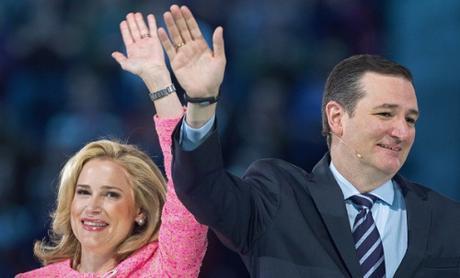
Heidi and Ted Cruz, March 23, 2015, Lynchburg, VA. (Photo Paul J. Richards/AFP/Getty Images)
Senator Ted Cruz’s wife, Heidi, is head of the Southwest Region in the Investment Management Division of the Wall Street investment bank Goldman Sachs, on a temporary “leave” because of Ted’s presidential campaign.
Heidi Cruz is also a former investment banker for J.P. Morgan and a “historical member” of the Council on Foreign Relations (CFR), for which she served as a member of the CFR-sponsored Independent Task Force on the Future of North America, which a North American Union. (See “Is Ted Cruz an advocate of a North American Union?“)
Although Heidi Cruz presently is on leave, she was fully working for Goldman Sachs in 2012 when Ted obtained a low-interest $1 million loan from her employer for his senatorial campaign. To top it off, Ted Cruz did not disclose the loan as he is required by law.
The New York Times reports on Jan. 13, 2016, that campaign finance reports show that in the critical weeks before the May 2012 GOP primary, Ted Cruz put “personal funds” totaling $960,000 into his Senate campaign. Two months later, shortly before a scheduled runoff election, he added more, bringing the total to $1.2 million — “which is all we had saved,” as Cruz described it in an interview.
But a review of personal financial disclosures that Cruz filed later with the Senate does not show a liquidation of assets that would have accounted for all the money he spent on his campaign. What it does show, however, is that in the first half of 2012, Ted and Heidi Cruz obtained a low-interest loan from Goldman Sachs, as well as another one from Citibank. The loans totaled $750,000 and eventually increased to $1 million before being paid down later that year. Both loans had floating interest rates around 3%, generally in line with rates available to wealthy borrowers at that time.
Neither loan appears in reports filed by Cruz’s senate campaign committee with the Federal Election Commission (FEC).
Candidates are required to disclose the source of money they borrow to finance their campaigns. Other campaigns have been investigated and fined for failing to make such disclosures, which are intended to inform voters and prevent candidates from receiving special treatment from lenders.
A spokeswoman for Cruz’s presidential campaign, Catherine Frazier, acknowledged that the loan from Goldman Sachs, drawn against the value of the Cruzes’ brokerage account, was a source of money for the Senate race, but insisted that the failure to report the loan was “inadvertent” and that there had been no attempt to hide anything. Frazier did not address whether the Citibank loan was used also for Cruz’s Senate race.
Former election commission lawyer who specializes in campaign finance law Kenneth Gross, however, disagrees.
Gross said that listing a bank loan in an annual Senate ethics report — which deals only with personal finances — would not satisfy the requirement that it be promptly disclosed to election officials during a campaign: “They’re two different reporting regimes. The law says if you get a loan for the purpose of funding a campaign, you have to show the original source of the loan, the terms of the loan and you even have to provide a copy of the loan document to the Federal Election Commission.”
Specifically, in failing to report the two bank loans to the FEC, Cruz violated:
- 52 USC 30104 (b)(2) (6), which requires the committee of a federal candidate to disclose on a report filed “loans made by or guaranteed by the candidate”; and
- 52 USC 30104(b)(4)(d), which requires the reporting of “repayment of loans made by or guaranteed by the candidate”.
ZeroHedge points out that someone will have to file an official complaint against Cruz, and the FEC could impose fines. But if evidence emerges that his failure to disclose the loans was ‘knowing and willful,’ he could be criminally prosecuted by the U.S. Department of Justice, according to campaign finance experts.
Aside from Ted Cruz’s dishonesty in not reporting the loans to the FEC, there is also the matter of his hypocrisy.
In 2012 when he ran for the Senate as a darling of the Tea Party, and in his current presidential campaign, Ted Cruz presents himself as a populist for the “little man,” against Wall Street bailouts and the influence of big banks in Washington. Recently, when asked about the political clout of Goldman Sachs in particular, he replied:
“Like many other players on Wall Street and big business, they seek out and get special favors from government.”
As financial analyst Martin Armstrong puts it:
The dishonesty here is that Cruz has pretended to stand against the bankers…. I am sorry. But Cruz is bought and paid for and would be in the pocket of the New York Banks no different than Hillary, Bush, or the rest of them who take money from this crowd. You do not forget to report a loan from Goldman Sachs when your wife is a managing director. Come on. How stupid do we have to be to entertain this excuse?
See also:
- Something stinks: Ted Cruz’s Super PAC donated $½ million to Carly Fiorina’s campaign
- Republican Sen. Ted Cruz announces presidential campaign, but is he eligible?
~Eowyn

